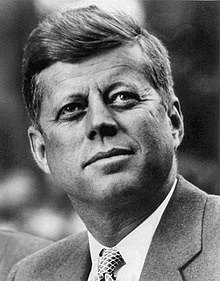JFK assassination documents bared, but Trump holds back hundreds
27 Oct 2017
The US National Archives on Thursday night released a hefty cache of of 2,800 documents related to the 1963 assassination of President John F Kennedy, even as President Donald Trump blocked the release of hundreds of other files on the issue, bending to appeals from the Central Intelligence Agency and the Federal Bureau of Investigation.
 | |
| President John F Kennedy |
''I have no choice,'' Trump said in a memo, citing ''potentially irreversible harm'' to national security if he were to allow all records to come out now. He placed those files under a six-month review.
Congress had ordered back in 1992 that all remaining sealed files pertaining to the investigation into Kennedy's death should be fully opened to the public through the National Archives in 25 years, by 26 October 2017, except for those the president authorised for further withholding.
Trump had confirmed on Saturday that he would allow for the release of the final batch of once-classified records, amounting to tens of thousands of pages, ''subject to the receipt of further information.''
But as the deadline neared, the administration decided at the last minute to stagger the final release over the next 180 days while government agencies studied whether any documents should stay sealed or redacted.
As for the unreleased documents, officials say Trump will impress upon federal agencies that ''only in the rarest cases'' should JFK files stay secret after the six-month review.
The documents approved for release show federal agents madly chasing after tips, however thin, in the days after the assassination and struggling to cope with rumours and leads worldwide.
Toppling Castro
The materials also cast a wide net over varied activities of the Kennedy administration, such as its covert efforts to upend Fidel Castro's government in Cuba.
A 14 September 1962 meeting disclosed in the files, for example, a group of Kennedy's senior aides, including his brother Robert, the attorney general, discussed a range of options against Castro's communist government.
The meeting was told the CIA would look into the possibility of sabotaging airplane parts that were to be shipped to Cuba from Canada. McGeorge Bundy, JFK's national security adviser, cautioned that sensitive ideas like sabotage would have to be considered in more detail on a case-by-case basis.
Despite having months to prepare for disclosures that have been fixed on the calendar for 25 years, Trump's decision came down to a last-minute debate with intelligence agencies.
The rest will be released ''on a rolling basis,'' with ''redactions in only the rarest of circumstances,'' by the end of the review on 26 April 2018, the White House said in a statement.
In a memo to government agency heads, Trump said the American people deserved as much access as possible to the records.
''Therefore, I am ordering today that the veil finally be lifted,'' he wrote, adding that he had no choice but to accept the requested redactions for now.
A Central Intelligence Agency spokesman told Reuters that every single one of approximately 18,000 remaining CIA records in the collection would ultimately be released, with just 1 per cent of the material left redacted.
In the meantime, experts will be poring through a mountain of minutiae in search of significant revelations.
Much of Thursday passed with nothing from the White House or National Archives except silence, leaving unclear how the government would comply with a law requiring the records to come out by the end of the day - unless Trump was persuaded by intelligence agencies to hold some back.
White House officials said the FBI and CIA made the most requests within the government to withhold some information.
Conspiracy theories
No blockbusters had been expected in the last trove of secret files regarding Kennedy's assassination, given a statement months ago by the Archives that it assumed the records, then under preparation, would be ''tangential'' to what's known about the shooting.
But for historians, it's a chance to answer lingering questions, put some unfounded conspiracy theories to rest, perhaps give life to other theories - or none of that, if the material should add little to the record.
Trump ordered agencies that have proposed withholding material related to the assassination to report to the archivist by next 12 March on which specific information meets the standard for continued secrecy.
That standard includes details that could cause ''harm to the military defense, intelligence operations, law enforcement or conduct of foreign relations,'' Trump wrote in his order. The archivist will have two weeks to tell Trump whether those recommendations validate keeping the withheld information a secret after 26 April.
Whatever details are released, they're not expected to give a definitive answer to a question that still lingers for some: Whether anyone other than Lee Harvey Oswald was involved in the assassination.
The Warren Commission in 1964 concluded that Oswald had been the lone gunman, and another congressional probe in 1979 found no evidence to support the theory that the CIA had been involved. But other interpretations, some more creative than others, have persisted.


















